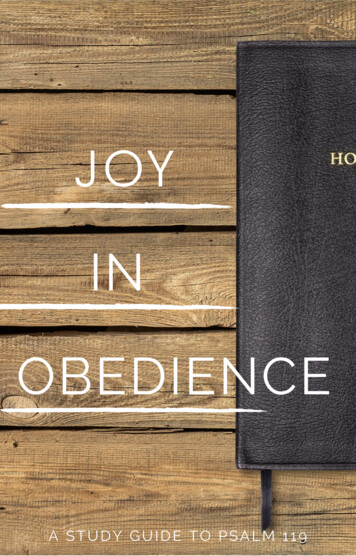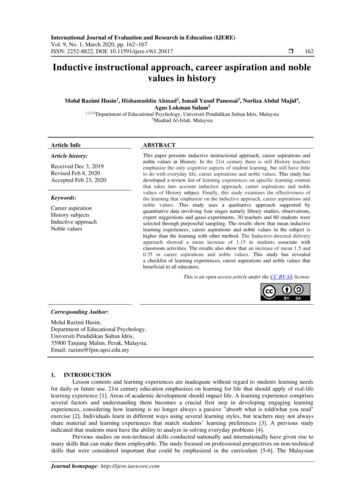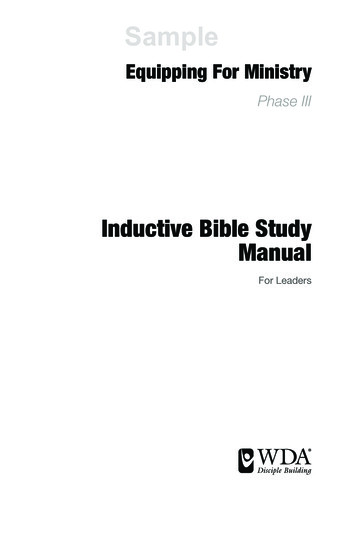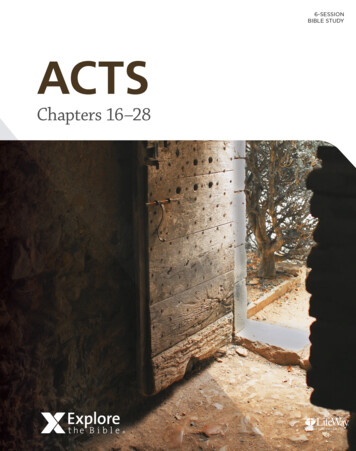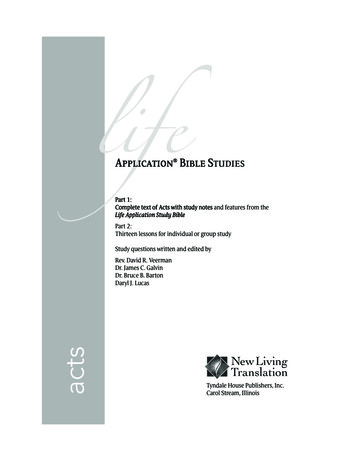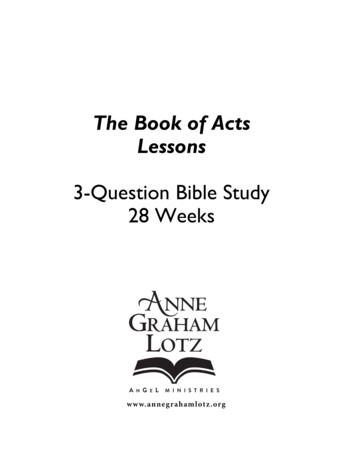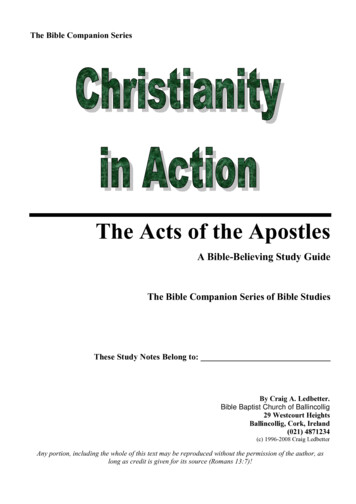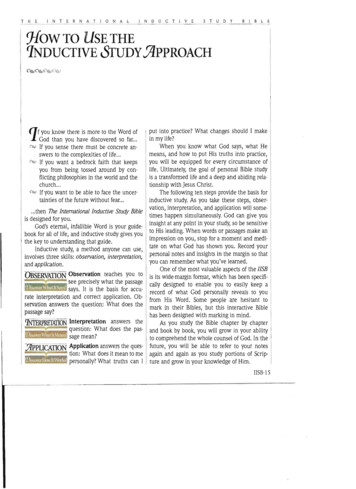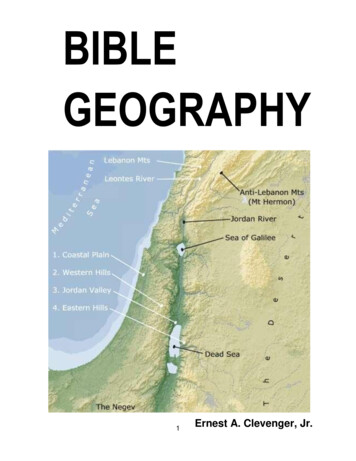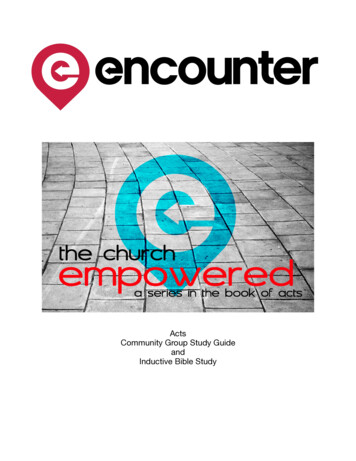
Transcription
!!!ActsCommunity Group Study GuideandInductive Bible Study!!!!!!
!!!!!!!!!!!!!!!!!!!!!!!!!!!!!!!!!!!!!!!
Week 1: Notes From the MessageKey Verses:What was the Big Idea?
Week 1Acts 1:1-11Read Acts 1:1-11Jesus is alive! The Bible teaches this, showing it to be true on every page, and itpromises he will return. Much like the apostles, we too have our own ideasabout what we’d like Jesus to do for us (e.g., “Lord, will you at this time restorethe kingdom to Israel?”), but Jesus graciously keeps the apostles-and us-ontrack. In the meantime, for those who are in Christ Jesus, God the Holy Spirit willcome in power, enabling them to witness to others the powerful work of Jesus’death, burial, resurrection and ascension.!Community Group Questions!1. Do you believe Jesus Christ is alive?!!2. Is the Holy Spirit living inside of you?!!3. Who are you witnessing to about what Jesus did and taught?!!4. Which proofs of Jesus’ resurrection mean the most to you?!!!WEEK 1INDUCTIVE BIBLE STUDYThis inductive Bible study is NOT intended for the community group. But itis a great opportunity for you to do some discipleship with a few friends inyour community group.!BACKGROUND AND INTRODUCTION!In some ways, the story surrounding Jesus Christ can be difficult to believe. Weseek answers to our many questions about the gospel--from Jesus’ miraculousconception to his perfect sinless life. If he was God, how could he die? And if he
had died, how could he rise? These questions have been asked by countlessnumbers of people for more than two thousand years.Can you imagine experiencing these events in person? Hearing rumorsabout a man who truly believes he is God? Luke, author of the Gospel of Luke,was an educated doctor who was on a mission to find out the facts and recordthe truth about Jesus. With information proliferating by letter and word of mouth,the stories of these unbelievable experiences needed to be recorded and heardby God’s people.Originally, Luke’s Gospel and Acts were one piece of writing; eventually,they were divided into two books at an unknown period of time. The gospel setthe stage for how the life, death and resurrection of Jesus would prepare theapostles, the people chosen by Jesus to start the early church, the spread hismessage to the ends of the earth.Written in approximately AD 70, the book of Acts most distinctivelyconsists of speeches or sermons (i.e., about one-third of the total text) andprovides journey narratives of the Christian missionaries who preached thegospel under the influence of the Holy Spirit.The book of Acts gives us a picture of evangelism, persecution,community, miracles, and conversion. It presents stories of the unbelievable andthe unplanned--a true representation of the Holy Spirit’s work in the lives of theapostles and in our lives today.!OBSERVATION!1. What was Luke referring to in verse 1 when he said “the first book”?2. Who was this letter written to? What relationship did he have with theauthor?3. Read Luke 1:1-4. What was Luke’s writing style? What was his intent? Howdoes it compare with other genres in the Bible?4. What places and major events were referenced throughout Acts 1:1-11?!INTERPRETATION!As Luke introduced the book of Acts, he referenced Jesus’ actions and theevents that happened to him, providing a significant foundation upon which therest of Acts is based. Before Jesus ascended to heaven, he continued preparingthe apostles for the work they would do once he was gone. They had alreadyspent years by his side witnessing his teaching and miracles, and later in thebook the Holy Spirit was sent to further help them in their missionary journeys.!
1. How did Jesus prepare the disciples for life without him? Why would thishave been so difficult for the apostles to understand?2. Read about the resurrection of Jesus in Luke 24:13-49. The truths of Jesus’resurrection and ascension are pivotal to the entire foundation of Christianity.Why is this? What are some of the “many proofs” (Acts 1:3) thatdemonstrated he was truly alive?3. In Acts 1:6, the apostles asked, “Lord, will you at this time restore thekingdom to Israel?” Why do you think they wanted to ask this particularquestion?4. After Jesus ascended into heaven, the apostles spent time “gazing intoheaven” (v.10). Luke also uses the word worshiped to describe their reactionin Luke 24:52. Why do you think they had this response? As they stoodlooking into the sky, why do you think they were questioned by the two menin white robes?!APPLICATION!Recently, a dear friend lost her husband to cancer. Crying out to God, shewanted to know and understand his plan. Why do young men die? What isGod’s plan when disaster strikes? All of us are seeking answers. And yet Jesusreminds us in this passage that sometimes it is not for us to know the plan, butto trust in the power of the Holy Spirit today (vv.7-8).Like the hurting, suffering people in our lives, we may not always knowGod’s exact plan, but similar to the apostles, Jesus has given a directive toworship him and be comforted by the direction he has given through his Word.We may not see the end game, but we know that he is in charge, that he is goodand that he has given us everything we need through the empowering of theHoly Spirit.!1. When you think about the future, what plans are you desperate to knowabout? Do you ask God for his plan or insist on your own?2. Instead of being faithful with what God has given us, we can look to thefuture for promised comfort, relief, security and provision. In what ways hasthe Holy Spirit asked you to be faithful with what he’s given now? Whatthings are you overlooking or ignoring?3. God gives some people specific callings for their lives, but in general, hecalls all Christians to live by the power of the Holy Spirit, regardless of theircircumstances. One example from this passage is being his “witnesses” (v.8). How can you grow as a witness to Jesus’ work?
4. Since Scripture tells us of Jesus’ resurrection and ascension, we know he isalive today. Why is this comforting? Do you live in relationship with Jesus asif he is alive? How would that look different?5. The apostles demonstrate many questions and doubts as they process allthey see and hear about Jesus and his plan to restore all things. They haveideas about what the coming kingdom should look like, but Jesus has otherplans. What false kingdom are you putting your hopes in? How does thatfalse kingdom get in the way of what Jesus is calling you to?!!!!!!!!!!!!!!!!!
Week 2: Notes From the MessageKey Verses:What was the Big Idea?
Week 2Acts 1:12-26Read Acts 1:12-26!How do you manage to respond to the difficult issues of life? We don’t oftenhave to face outright betrayal in a small group context, as reflected in thisweek’s reading. But we can learn from how the early believers faced theproblem. We must gather as a community to pray for guidance when God iscalling his people to mission.!COMMUNITY GROUP QUESTIONS!1. Does your group pray together?!!2. Are you praying for your leaders and asking God to put the right leaders inplace where there are needs?!!3.!!4.!!What inhibits you from praying together?What encourages you to pray together?5. As leaders in the church leave, who steps up to the lead? Have you beencalled to serve?!!!WEEK 2INDUCTIVE BIBLE STUDYThis inductive Bible study is NOT intended for the community group. But itis a great opportunity for you to do some discipleship with a few friends inyour community group.!BACKGROUND AND INTRODUCTION
!Love and loyalty. Faithfulness and devotion. Treachery and betrayal. Murder andsuicide. Hope, expectation and restoration. Such are the elements permeatingLuke’s account of Jesus’ death and resurrection and the beginning of the earlychurch. The tension-filled drama draws us in, then reveals a new beginning.Luke’s Gospel tells a real story, and it continues in Acts 1:12-26.The early church was in its infancy, and Luke faithfully recorded the eventsfollowing Jesus’ ascension into heaven. Peter, the disciple who had once deniedJesus, whom Jesus exhorted to feed his sheep, now took leadership. The youngchurch was facing a vacancy in leadership and was still reeling from thegrievous recognition that one of their closest companions had betrayed Jesus.Peter pastorally guided them in understanding the circumstances and what hadto take place in response. It’s no accident that some of the first challengesfacing the church were leadership decisions and dealing with the results of sin.God, who loves the church that Jesus died for, was preparing believers for thecoming of the Holy Spirit and the future of his mission on earth.!OBSERVATION!1. Where had the disciples been in verse 12? What had they witnessed whilethere?2. Name the men who were in the upper room in Jerusalem. What names arefamiliar to you? Who else was with them?3. What were the people doing in the upper room?4. How many were in the “company of persons” that Peter addressed?5. What two observations does Peter make to introduce his comments aboutJudas?6. How does Peter describe the story of Judas’s betrayal in verses 17 and 17?7. What criteria were applied o determine who would qualify as the twelfthapostle? Who was considered?8. What two methods were employed to determine the chosen apostle? Whowas chosen? Why?!INTERPRETATION!The Holy Spirit inspires Scripture, and as we study it, he reveals details thatenhances and enrich our understanding of his intent. A close look at thesequestions helps us uncover some of the finer points of this passage that wemight otherwise overlook.!
1. The short Sabbath-day walk that Luke recorded suggests the disciples mighthave stayed in an upper room not far from the temple. Review Luke24:50-53. What were the disciples doing in verse 53? How does thiscomplement Acts 1:14? In what two activities were the people engaged?What does this tell us about the community of believers? What were theypraying for? (See Acts 1:4,5,8) What can we learn from their example?2. Read Acts 1:14, 4:24, and 5:25. The early church functioned as acommunity, not only sharing food and possessions but also oneness ofagreement and purpose. The Greek word homothumadon is translated “withone accord.” Luke uses this word ten times, and it occurs only onceelsewhere in the New Testament. What do these verses signify about theChristian community in Acts?3. Read Luke 24:25-27, 32, and 45-49. What do these verses tell us? To whomdo the Scriptures point? Now read Acts 1:15-17. Peter laid the foundationfor replacing Judas by pointing to the authority of the Scripture. What truthsdo these three verses affirm about Scripture? What does this tell us aboutthe character of God?4. Jesus taught the disciples that Old Testament Scripture confirms God’s plan.Read Psalm 69:25 and Psalm 109:8 and compare these verses with Acts1:20. What Old Testament prophecies were being fulfilled in this situation?What does this tell us about God’s intentions for the church?5. Review Acts 1:21-26. Following Judas’ treachery, the Twelve needed to berestored. Why? Why was it important that the specifications for an apostlewere fulfilled? This is the last instance in Scripture of casting lots. Why didthey cast lots? Why was the casting of lots no longer needed after this?!APPLICATION!1. The early church has much to teach us about perseverance in prayer. Whatare you bringing before God in persevering prayer? What gives you theconfidence to continue?2. How do you discover God’s will? It’s not likely that you cast lots! Thispassage shows us that the guidance of Scripture, prayer and common senseare three reliable ways through which we can discern God’s direction in ourlives. Have you ever heard someone justify sinful actions by saying “God toldme ”? How does Scripture reveal right action to us? (See 2 Timothy 3:16.)Do you consult the wisdom of godly counselors? (see Proverbs 11:14, 27:9)How do you pray to discern God’s will?3. Judas hardened his heart in the face of God’s grace. Despite walking withJesus, witnessing miracles, and seeing God’s redemptive plan unfold before
his very eyes, he was complicit in Jesus’ murder. Reformer John Calvin says,“Judas may not be excused on the ground that what befell him wasprophesied, since he fell away not through the compulsion of the prophecybut through the wickedness of his own heart.”* What have you hardenedyour heart to, and how have you resisted God’s grace? How will you repent?What lies do you believe? What truths will replace these lies?4. All of the apostles named in this passage were witnesses to Jesus’ ministryon earth and the amazing events of the early church. Many of them are neverheard from again. Yet we believe they were faithful to the task given them.Most of us are not famous or renowned in any way. What is God calling youto be faithful to, even though it may not be remembered?!!!!!!!!John R. W. Stott quoting John Calvin. The Message of Acts!!!!!!!!!!!!!!
Week 3: Notes From the MessageKey Verses:What was the Big Idea?
Week 3Acts 2:1-13Read Acts 2:1-13This week’s Scripture passage depicts the wonderful scene at Pentecost: theSpirit’s presence is experienced as a rushing wind and fire. Simple fishermenbegin speaking in foreign languages about the mighty works of God whileonlooking crowds are confused by what they see and hear.No doubt this is a strange scene. But even more strange are the measurespeople take to avoid the truth that Jesus is God and that he came to savesinners. The crowd’s version of making sense of the situation here is to believethat all those preaching in their own languages are drunk! That seems like apretty unlikely explanation. Who’s heard of a party where people drank too muchwine and began speaking in languages they didn’t previously know? Maybe this“new wine” was pretty special.Those who have eyes to see will realize that the striking thing about thisscene is God’s desire for all people of every nation and tongue to hear the goodnews of Jesus. God will go to great lengths – including gifting believers with themiraculous ability to speak unknown languages – so that the good news ofJesus is proclaimed to all people.COMMUNITY GROUP QUESTIONS!1. The Holy Spirit is associated with “rushing wind” and “fire.” We don’t oftensee God working in these kinds of ways, but even when we don’t, the Spiritis definitely still at work. How have you seen God the Spirit move powerfullyin your life and community?2. How would you like to see him move?3.!Take time to pray for this in group.!4. What gifts has God given you, and how are they benefitting the church asyou use them to proclaim the kingdom?!5. How do you specifically need power from the Holy Spirit to do what he’scalled you to do? Take some time to pray for one another in group?!
!WEEK 3INDUCTIVE BIBLE STUDYThis inductive Bible study is NOT intended for the community group. But itis a great opportunity for you to do some discipleship with a few friends inyour community group.!BACKGROUND AND INTRODUCTION!Have you ever attended a sporting event and watched a team or an athletemake a dramatic entrance onto the field or toward the ring? The Holy Spiritmade quite an entrance in the second chapter of Acts. Imagine yourself waitingin Jerusalem with the other believers, wondering to yourself, Who is this HolySpirit of which Jesus spoke?Yet in the midst of pondering these things, they knew they had to get towork and choose a new disciple to replace Judas Iscariot. As they weregathered on the day of Pentecost, a sound like a rushing wind came fromheaven, and individual tongues of fire came to rest on each person. The HolySpirit entered the scene! In Acts 1:8, Jesus had declared that the Holy Spiritwould come upon them, giving them power to be his witnesses. Events of thisweek’s Scripture passage confirmed this very promise.Now imagine how this event would have boosted their morale. Theprophesied coming of the Spirit was happening in their midst. At last this small,defeated, ragtag, down-and-out group of believers were receiving theempowering of the Holy Spirit and would have everything they’d need for themission Jesus had called them to.While the Holy Spirit has been present up to this point throughoutScripture, it is here at Pentecost that his presence began to be poured out in anongoing way rather than as a limited allowance for specific moments of ministry.As the third person of the Trinity, the Holy Spirit was sent into the world toempower believers to live righteous lives and proclaim the gospel (John14:16-17; Acts 1:1-8; Luke 24:49).He counsels and comforts believers (John14:16; Acts 9:31). He teaches and guides believers (John 14:26; Act 8:29) Heconvicts of sin and leads them toward holiness (John 16:8-11; Galatians5:16-25) He prays on behalf of others (Romans 8:26-27). And he empowersChristians to do the work they have been called to (Luke 4:18-19; 1 Corinthians12:11). Pray that the Holy Spirit will be active in your life and that you will openyour heart to his guidance.!!
OBSERVATIONThis section of Acts is pivotal to the rest of the book as well as the rest of theNew Testament. The disciples received direction for accomplishing the missionGod had laid out for them as he blessed his people with the Holy Spirit, fillingthem with his presence and enabling them to witness his power to others.!Read Acts 2:1-41. When and where does this event take place?2. Who is there?3. What signs accompany the presence of the Holy Spirit?!Read Acts 2:4-131. Where are the devout men from?2. Describe the two responses to hearing the disciples speak in other tongues.!INTERPRETATIONSome may correlate the “other tongues” spoken by the 120 believers atPentecost to the passages on tongues in 1 Corinthians 12 and 14. But thenarratives in Acts and 1 Corinthians are divergent in their expression andpurpose. At Pentecost, there was no need for an interpreter because the HolySpirit enabled the speakers to communicate in the diverse languages of thehearers. The 1 Corinthians passages, however, specify that tongues needinterpretation and are largely for personal edification and enhancing one’sconnection with God (1 Corinthians 14:2).!1. Leviticus 23:15-16 commands the Israelites to celebrate the Feast of Weeks,or Pentecost (a transliteration of the Greek word pentikosti, which means“fiftieth”), on the fiftieth day after Passover. Within Jewish history, this date isalso known as the anniversary of the giving of the Law at Mount Sinai(Exodus 19:1) Why do you think God filled the believers with the Holy Spiriton this same day? (For further study, see Matthew 5:17-20; Luke 24:36-49;Romans 8:1-11.)2. Acts 2 has a mission-oriented thrust. In addition, it also presents a picture ofthe reversal of what happened in Genesis 11, where God used differentlanguages to divide the people who are building the Tower of Babel. Acts 2recounts these people groups and their varying languages being drawntogether. Before Jesus ascended into heaven, he commissioned thedisciples to go into all the earth and make disciples of all nations. (Mark16:15; Matthew 28:19). How does the believer’s sudden ability to speak inother tongues fit with these verses?
!APPLICATIONThere are various ways people respond to the biblical account of the giving ofthe Holy Spirit. Some are completely confused about the idea of a mysticalspirit, while others can identify because they have felt his presence. At times,our lack of understanding regarding the roll of the Spirit, and sometimes poorteaching, can lead us to believe the work of the spirit is baffling or scary. We canbe tempted to mock others experiences or safely try to figure it out on our own.Regardless, it’s clear that as the Spirit worked in Acts, he provoked a responseand drew a crowd.!1. Thinking back on your personal history, what is your experience with theHoly Spirit? How does your past history color your view of this passage?2. What is your gut response to this text? Share it with the group.3. When we trust in Christ for salvation, he gives the Holy Spirit to help us andbless us. (See the introduction to this week’s study.) Do you trust in Jesusand his life, death and resurrection for salvation? If not, and you would likemore information, please talk to your table leader.4. In what ways have you seen the Holy Spirit work in you or in people aroundyou?5. This section of Acts often causes debates about the miraculous gifts. Whileit’s true that God the Holy Spirit is at work in our present time, we can stillmiss the point of this passage. God has been at work throughout history,drawing all people to himself and making his redemptive plan known throughfulfilling the prophecy in Joel 2:28. In short, God was ushering in a new eraand gifting the early church with the empowering of the Holy Spirit. First, theSpirit brought Jesus’ good news to the disciples, then to 120 Jews, then toSamaritans, to Gentiles in the surrounding area, and finally to the entireworld. We are a part of the continuation of the Spirit’s work in the twenty-firstcentury. How have you seen the Spirit’s work evidenced in your life? In yourchurch community? In what ways has the Holy Spirit empowered you to helpadvance the proclamation of the gospel?!!!!!!!!
Week 4: Notes From the MessageKey Verses:What was the Big Idea?
Week 4Acts 2:14-41Read Acts 2:14-41!Hundreds of years prior to the day of Pentecost, through the prophet Joel, Godthe Father promised to pour out his Spirit. The miraculous still occurs in our day,and some people are specifically gifted by the Spirit to see visions, dreamdreams and prophesy. But don’t miss the big idea: God’s plan is to use thesethings not as ends in themselves but as the fulfillment of prophecy and as signspointing to Jesus. The point is that Jesus Christ saves everyone who calls uponhis name. Jesus died for our sins, was raised up by God, and has freed us fromdeath. He now rules as King at the right hand of the Father. This wonderful truthcut its listeners to the heart back then, even as it does today. How should wenow respond? What should we now do? The same as then: repent and bebaptized. Obey God’s call. The church grew from 120 souls to 3,120 souls inone single day! To see the Spirit moving in our churches like this is somethingwe should pray for and joyfully expect until that “great and magnificent day”when the Lord returns.!Questions!1. Have you called upon the name of Jesus to be saved? If so, what is next? Ifnot, what holds you back from him?2. Those of you who have come to Christ, have you been baptized? If not,when is the next baptism service at your church?3. Who, by name, are you praying will be added to our number?!!WEEK 4INDUCTIVE BIBLE STUDYThis inductive Bible study is NOT intended for the community group. But itis a great opportunity for you to do some discipleship with a few friends inyour community group.!BACKGROUND AND INTRODUCTION!The apostle Peter is a great example of someone who is empowered by the HolySpirit. Having been a coward, Peter, full of the Spirit, was transformed into a
courageous man who gave some of the most memorable sermons in Acts. Peterhad previously been an uneducated fisherman who internally battled his owndoubt and failures. (Matthew 14:22-33;16:22-23; 26:69-75). In Acts, however, wesee a new man who unflinchingly confronted a group of Jews, directly accusingthem of crucifying the Son of God, their Messiah (Acts 2:36). The Holy Spiritgranted Peter the words to speak powerfully yet eloquently, piercing the heartsof the hearers, so they were convinced of their need to believe in Christ and bebaptized.!OBSERVATIONThis section comprises Peter’s response to those who had just witnessed thebelievers speaking in other tongues when the Holy Spirit came upon thebelievers gathered for Pentecost. The astonished observers asked, “What doesthis mean?” (Acts 2:12). Peter explained how receiving the Holy Spirit points toand proves Jesus as Lord and Christ.!Read Acts 2:14-21!1. Where, and with whom, did Peter stand?2. Messianic passages are those that point to the coming of a Messiah. Usethe cross-reference listed in your Bible to determine which Messianicpassage Peter said was fulfilled through the presence of the wind, tonguesof flame, and various spoken tongues that occur at Pentecost. In Acts2:17-8, who were affected by the Spirit being poured out?3. What wonders does God perform in the last days? Some commentatorshave noted that Peter was not just referencing the wonders of Pentecost, butalso those depicted by the Crucifixion and in the book of Revelation.4. Who will be saved when they call upon the name of the Lord?!Read Acts 2:22-26!5.6.7.8.To whom does the presence of the Holy Spirit point?Whose plan was it that Jesus be crucified? Who crucified and killed Jesus?Who raised Jesus up from death?What Messianic prophecy of David did Peter connect to Christ’sresurrection? See the cross-reference for Acts 2:25-28. In Acts 2:29-35,Peter made this connection real by comparing David’s status to Jesus’.Where is David now? Where is Jesus now?9. What verb was used in Acts 2:17, 18 and 33 for how God sends forth hisSpirit? What does this imply about who God is?
10. What final Messianic psalm did Peter use to declare Jesus as Lord? See thecross-reference for Acts 2:34-35.11. Who did mighty works, signs and wonders through Jesus? Who promisedDavid that he would set one of his descendants on his throne? Whopromised the Holy Spirit and poured out the Holy Spirit? Who has madeJesus both Lord and Christ?!Read Acts 2:37-411. How did Peter’s audience respond to his message?2. What did Peter call them to do, and what did Peter promise them?!INTERPRETATIONPeter addressed his sermon to an audience who had just witnessed themiraculous sights and sounds that occurred when the Holy Spirit was pouredout on the believers gathered for Pentecost. He used this opportunity to point toJesus as Lord and Christ because it fulfilled the promise that God would sendthe Holy Spirit after Jesus’ resurrection. Peter focused on the fact that Godwould send the Holy Spirit after Jesus’ resurrection. Peter focused on the factthat these miraculous signs were evidence of a good God who has a plan for hispeople and draws them to repentance.1. Acts 2:17-21, if compared with Joel 2:28-32, uses a few words that areslightly different. Instead of beginning the citation with “and it shall come topass afterward,” it begins with “and in the last days it shall be,” therebyimplying the last days had begun. Describe the actions which initiated theselast days. (See Acts 2:23-24, 32-33.) The view that we are in the last days isshared by the apostles throughout the New Testament (1 Corinthians 10:11;Heb. 1:1-2; 1 Pet. 1:20; 1 John 2:18). How does living in the last days affecthow we live?2. While God planned and knew that Jesus would die and be raised, Peterattested that the Jews had crucified and killed Jesus by the hands of lawlessmen. How does God’s plan and foreknowledge work together with people’sactions?3. Peter said this message is for “everyone whom the Lord our God calls tohimself.” Who works salvation in the believer? According to this text, whatrole does the believer have in his or her salvation?!APPLICATION1. In his sermon, Peter declared they are all witnesses to God raising up Jesusand fulfilling his promise to send the Holy Spirit (Acts 2:32-33). Peter alsoshowed that through the fulfillment of these three Messianic texts, “all the
house of Israel know[s] for certain that God has made [Jesus] both Lord andChrist” (v.36). Do you know for certain that Jesus is both your Lord andChrist? If you have any questions about what this means, or how it appliesto your life, please talk to your table leader. We would love to talk with youmore about it.2. After his sermon, Peter continued to bear witness to Christ and implore thepeople to repent. Is any part of you resisting this message? How is Godcalling you to respond right now?3. After receiving the Holy Spirit, Peter’s life was changed, and he boldlypreached the gospel to all who listened. Do you share the gospel with thosewho will listen? If not, what prevents you from doing so? Pair up around yourtable and take turns sharing the Good News. Who will you share this GoodNews with next--a friend, coworker, or neighbor?!!!!!!!!!!!!!!!!!!!
Week 5: Notes From the MessageKey Verses:What was the Big Idea?
Week 5Acts 2:42-4Read Acts 2:42-4This Scripture passage portrays the best picture of a small group—ever. As theearly church grew, they devoted themselves to the Word, prayer, and fellowship,sharing meal after meal as they gave generously and watched God do amazingthings in their community. These were not religious duties they were obligated tofulfill; these were things they longed to do, things they were privileged to do.Theearly church’s example paints a clear picture of what today’s believers should bedevoted to (i.e., the Word and prayer) and demonstrates how we can practicallylove and care for one another.!Community Group Questions1. This section of Acts isn’t necessarily a prescription for Christian community,but it does illustrate what a Spirit-filled community values and how they carefor one another.!2. Does your small group resemble the early church? How would you like yourgroup to grow in light of this week’s text?!3.!What keeps you from experiencing community as the early church did?4. Do you have any needs that could be met by other members of the group, ordo you know of others in the group who had needs you can help with?!5. Have you seen someone saved by Jesus recently? Share this with yourgroup and celebrate together.!WEEK 5INDUCTIVE BIBLE STUDYThis inductive Bible study is NOT intended for the community group. But itis a great opportunity for you to do some discipleship with a few friends inyour community group.!
BACKGROUND AND INTRODUCTION In small group ministries, we meet notonly for Bible study or to reflect on weekly sermons but
Community Group Study Guide and Inductive Bible Study! !!!!! Week 1: Notes From the Message Key Verses: What was the Big Idea? Week 1 Acts 1:1-11 Read Acts 1:1-11 Jesus is alive! The Bible teaches this, showing it to be true on every page, and it promises he will return. Much like the apostles, we too have ou

